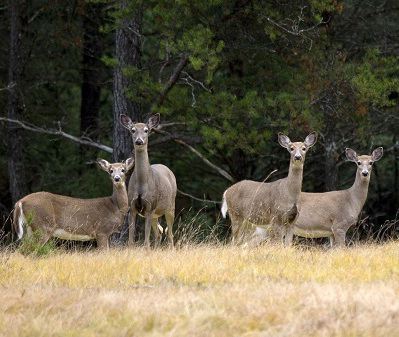Michigan: Federal Lab Confirms Montcalm County Deer Had CWD
With archery deer hunting season under way, DNR urges all hunters to take harvested deer to area check stations
The U.S. Department of Agriculture’s National Veterinary Services Laboratory in Ames, Iowa, confirmed Wednesday that a 3 1/2-year-old female deer taken during Michigan’s youth deer hunting season in September has tested positive for chronic wasting disease.
The animal, harvested in Montcalm Township in Montcalm County, is the 10th free-ranging deer in Michigan found to have chronic wasting disease. The youth hunter who harvested the deer opted to take the animal to a Department of Natural Resources deer check station and then submitted the animal for testing – steps the DNR strongly encourages hunters across the state to take during the 2017 deer hunting seasons.
“Because this family decided to bring their deer to a DNR deer check station, state wildlife managers were able to gain important information about chronic wasting disease in mid-Michigan,” said Dr. Kelly Straka, DNR state wildlife veterinarian. “As we move through the archery and firearm seasons, voluntary deer testing will be critical not only within the currently affected areas, but also throughout the south-central Lower Peninsula and the entire state.”
CWD is a fatal neurological disease that affects white-tailed deer, mule deer, elk and moose. It is caused by the transmission of infectious, self-multiplying proteins (prions) contained in saliva and other body fluids of infected animals. Susceptible animals can acquire CWD by direct exposure to these fluids, from environments contaminated with these fluids or the carcass of a diseased animal.
Some CWD-infected animals will display abnormal behaviors, progressive weight loss and physical debilitation; however, deer can be infected for many years without showing internal or external symptoms. There is no cure; once a deer is infected with CWD, it will die.
Since May 2015, the DNR has actively conducted surveillance for CWD. To date, more than 14,000 deer have been tested since the first positive case was found, with 10 cases of CWD confirmed in free-ranging white-tailed deer identified in Clinton, Ingham and (now) Montcalm counties.
To date, there is no evidence that CWD presents any known risk to non-cervids, including humans, either through contact with an infected animal or from handling venison. However, as a precaution, the U.S. Centers for Disease Control and the World Health Organization recommend that infected animals not be consumed as food by either humans or domestic animals.
As additional deer have tested positive for CWD within Michigan, the DNR has put specific regulations in place. Currently, there are two CWD Core Areas, which are deer management units (DMUs) 333 and 359. To review regulations related to those areas, visit michigan.gov/cwd.
With Wednesday’s confirmation of chronic wasting disease in the Montcalm County deer, DNR Director Keith Creagh has signed an interim order (effective Oct. 4, 2017, through March 29, 2018) outlining next steps as governed by Michigan’s CWD Response and Surveillance Plan. The order:
Creates a nine-township Core Area that includes Douglass, Eureka, Fairplain, Maple Valley, Montcalm, Pine and Sidney townships in Montcalm County, and Oakfield and Spencer townships in Kent County. Within the Core Area specifically:
Institutes mandatory registration of deer at a check station within 5 miles of the new Core CWD Area, within 72 hours of harvest, starting Nov. 15. (Available stations currently are at Flat River State Game Area and Howard City.)
Removes antler point restrictions for the restricted tag of the combo deer license within the nine-township Core Area.
Allows antlerless deer to be tagged using the deer or deer combo license(s) during the firearm, muzzleloader and late antlerless seasons.
Institutes mandatory submission of the head for testing of a road-killed deer within 72 hours of pick-up.
Allows disease control permits, effective immediately, for landowners with five or more acres within the nine-township Core Area.
Bans the feeding and baiting of deer in Kent and Montcalm counties, effective Jan. 2, 2018, and encourages hunters not to bait and feed in these areas immediately.
The DNR will work with the Michigan Natural Resources Commission to make the order permanent, adjusting as needed in response to the evolving situation.
“In Michigan, there are 338 deer farms, regulated jointly by the Michigan Department of Agriculture and Rural Development and the DNR. MDARD is working with the farms that are within a 15-mile surveillance zone to ensure compliance with CWD testing requirements, implement increased inspections and monitor animal movement,” said MDARD State Veterinarian James Averill. “All regulated deer farms participate in the state’s CWD testing program; however, farms outside the surveillance zone will not have additional requirements.”
Starting Nov. 1, several new deer check stations near the new Core Area will accept deer for CWD testing. Archery hunters are strongly encouraged to have their deer checked at existing check stations during the early archery season.
A complete list of check stations, including locations and hours, as well as weekly CWD updates, are available at michigan.gov/cwd.




